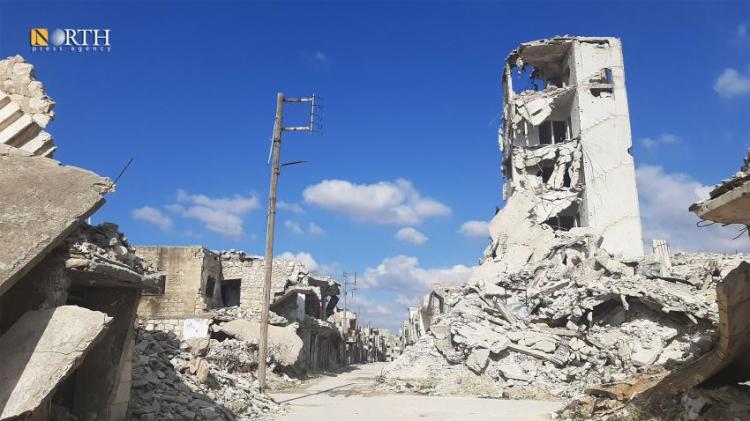Aleppo – North-Press
Zain Alabidine Hussein
Residents of the Sheikh Maqsoud neighborhood, on the northern side of the city of Aleppo, northern Syria, recall the shelling by Syrian armed opposition groups of the neighborhood with toxic gases on these days in 2016.
The targeting of the neighborhood with poison gas caused numerous injuries among the civilians of the neighborhood. The People’s Protection Units (YPG) had fended off attacks by opposition groups in 2012.
Shiyar Ali, one of the people injured as a result of the neighborhood’s bombardment, told North-Press what he saw on that day: "I was in my house along with my friends, we heard the sound of an explosion from the street behind my house, so we rushed to help the injured. We saw yellow smoke, and the children were unconscious. We realized that the neighborhood was being bombed with toxic gases because we had seen similar cases in 2013.”
"We immediately covered our faces with a piece of cloth, and we transferred the injured to the hospital, and we were also tested because of symptoms such as difficulty in breathing and tremors," he added.
Dr. Walat Maamo, an administrator of the Martyr Khaled Fajr Hospital, one of the contemporaries of the chemical attacks on the neighborhood, said that the Maarouf street in Sheikh Maqsoud was targeted by chemical gases in 2013, which caused the death of three citizens, "a four-year-old child and his parents, and fifteen others were injured. They were then transferred to the city of Afrin.”
Dr. Maamo added to North-Press that the Sheikh Maqsoud neighborhood was attacked with toxic gas again in April 2016, and many cases of suffocation arrived at the hospital, but they could not determine what gases were used. "We could not know what kind of gases were used due to the lack of capabilities in the hospital and the unavailability of laboratories at that time, but the clinical test of the injured confirmed their exposure to toxic gases, as the symptoms were obvious."
Among the injured, Dr. Maamo noted, were children and YPG soldiers who developed the same symptoms while trying to move injured civilians to the hospital.
Roshin Mousa, the co-chair of the People's Municipality in the Sheikh Maqsoud and Ashrafiya neighborhoods in Aleppo, who was among the witnesses to the incident, said that many civilians in the neighborhood lost their lives due to suffocation because of toxic gases at the first time, and the armed groups bombed the neighborhood for the second time with toxic gases in 2016. "There were many civilian casualties, and they were treated by hospital staff despite the hospital's modest capabilities."
Islam Alloush, the official spokesman for "Jaish al-Islam", admitted to shelling the Sheikh Maqsoud neighborhood using "unauthorized weapons in this type of confrontation."

